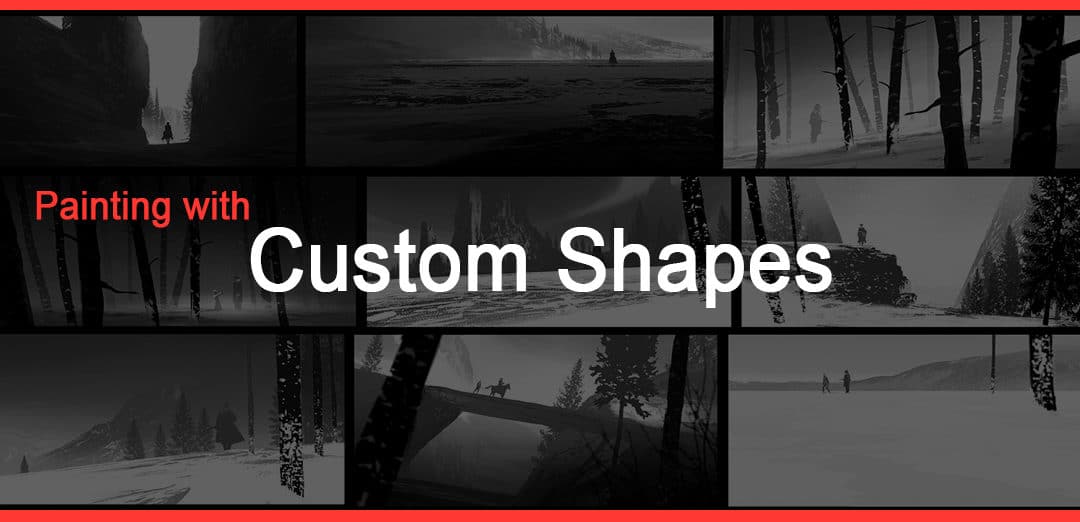
by Eliott Lilly | Jan 7, 2018 | Articles, slideshow
Learn how to quickly paint environments with Photoshop’s shape tool.
Freelance concept artist, David Paget, gives a demo on how to create thumbnails and compositions by using the shape tool. David will center around an old west theme as he creates a cinematic feel, while keeping a revenge story in mind.
For anyone who wants to improve their work, thumbnails are a good way to work out any problems that might happen in the future. Thumbnails let you work the camera angle, depth of field, and composition before you concentrate the rest of the time rendering. Enjoy!
Click on the link below:
Custom Shapes
Want to help us grow our resources section? If a resource has helped you greatly please e-mail it to me or any suggestions
to: me@eliottlillyart.com. I will be keeping this list updated as I discover new entries. Thank you--

by Eliott Lilly | Jan 7, 2018 | Articles, slideshow
Three myths about your art career.
When starting out in the industry, it might be hard to figure out your place and how to succeed among the many talented and already working artists. Artist, Johnny Atomic (John Jackson), from The Art Career Project offers a bit of an insight into some of the most commonly known myths amateur artists face daily.
If you have your own advice or myths, email us. We’d love to hear your stories and possibly interview you if you have plenty of wisdom to share with the BBWCA community.
Click on the link below:
The Competition Myth – 3 Advantageous Truths
Want to help us grow our resources section? If a resource has helped you greatly please e-mail it to me or any suggestions
to: me@eliottlillyart.com. I will be keeping this list updated as I discover new entries. Thank you--
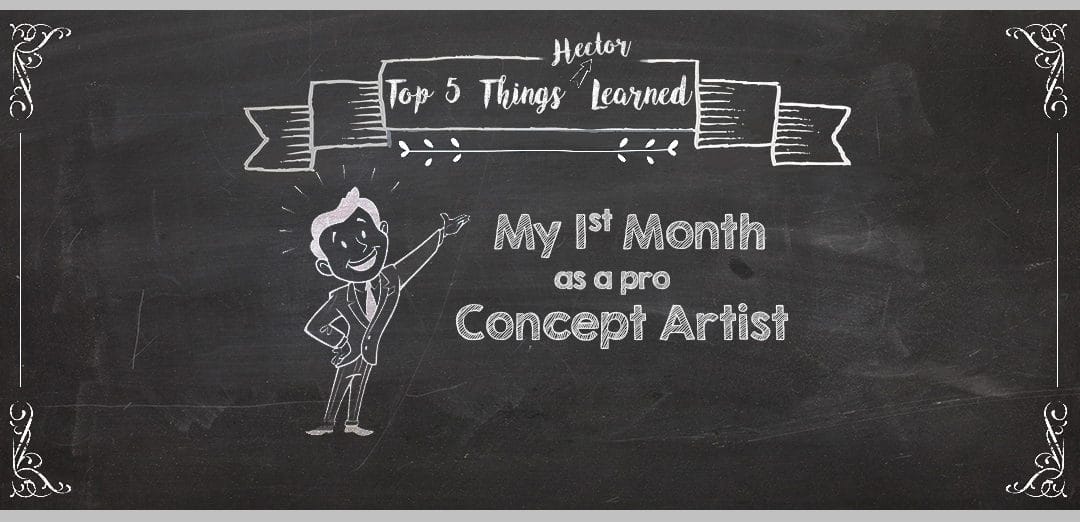
by Eliott Lilly | Jan 7, 2018 | Articles, slideshow
Hector Ruiz discusses what he learned during his first month as a professional concept artist at a non gaming/film studio.
Hello everyone, Hector here giving you an insight into my professional life as a recent professional concept artist at a studio. I will be starting a series of “Top 5 Things Hector Learned” in order to give young aspiring artists an idea of what goes on after you find your first job at a studio.
Although I’ve done freelance before as a professional, I’ve never had the experience working at a studio. Also, I should point out that although I am involved in pre-production and production, I work at a studio that is not related to the video game/film industry. My work is primarily used for concepts that can become a reality (real-life products, vehicles, etc.)
Let’s begin!
Expectations vs. Reality
During my first day I was expecting to start of at a fairly easy pace in order to acclimate myself to the studio and their pipeline. This is some people call the “honeymoon phase.” Instead, I was put in a project that was very important and needed a certain look that I just wasn’t hitting right off the bat. I was stressed out for a week figuring out how to make the clients happy. I hardly slept as I worked with another colleague of mine. He made models and I was in charge of compositing everything (I was the pitch illustration guy). The studio hasn’t set up all my software yet so I had to work from home. This made communicating more challenging. When working in an office, it can be easier from a communication standpoint but having your own space is important too, luckily we can get some folding walls to give us that separation.
Communication
When you’re one of two people responsible for visualizing concepts, and client work starts to accumulate to the point that you have to start working on multiple projects at the same time, it is extremely important to keep communication with your art director and your creative director. On top of that, you may have to keep the producers on the know as they may have to keep track of all the projects you are working on. Although I was loving all the things I was working on, I had to set up priorities on what projects needed the most attention. Since some of the software I was using was at home, I also had to make sure my coworkers knew I was away. At one point people thought I just disappeared when I was really working hard at home. People think that working from home has lots of benefits. And believe me, it does; saving on a commute and the rent of an office is great! Plus, with the help of virtual offices, you can still look professional to clients and potential partners who perhaps don’t approve of working from home; you can find out more at https://yourvirtualofficelondon.co.uk/. However, there’s no denying that there are some downfalls. Don’t get me wrong, I did enjoy it, but there were a few things that bugged me. Another thing that I hate about working from home is the lack of comfort. My office setup is pretty basic and I have to sit on an old chair all day. It’s not fun! I’ve recently been having a look at some chairs from office monster. If I’m going to be working from home on a regular basis, I will definitely need to invest in a decent chair!!
Learning on the Job
The one thing that changes when you get a job in a studio is the time you have to review or learn about a certain technique or skill. When you are asked to create something you have little experience with, you have to make sure to learn the material while creating good quality work. For example, I was given a UI design project I had little to no experience with. I ended up buying a tutorial from Learn Squared in order to catch up and create work that looked appealing. I spent extra hours at home figuring out how to understand the concepts and illustrate them. Overall, I crammed a few weeks worth of tutorials into one week I was given at work.
You also have to become the MacGyver of concept art by finding every possible tool you can in order to get the job done. This is why it’s very important to be well rounded and familiar with a variety of software. Studios like it when you can plug into their pipeline seamlessly without having to give you a grace period for you to learn their software practices.
Setting Up Your Hours
This topic is one that seems to have the least fun, but it makes the biggest difference in your performance and income. As a freelancer, it was easy for me to write up my invoices and detail my work based on per day basis. Having to do this in a studio with software that isn’t too intuitive can take some precious time away from creating art. When I had to work from home, it would become difficult to write my times, and even if I wrote them the following day at the studio, it would take more time away from other things I could be doing. If you are a lot more organized than I am, I would suggest writing important information down on something like a whiteboard. This way, it’s clear and right in front of you to see. If you don’t have one, go here and buy one. It’s also satisfying wiping away the completed tasks once you’ve finished. I should have taken my own advice and wrote down anything new I had learned or anything I was struggling with, as I ended up writing a ridiculous amount of hours that got the HR department concerned, only because I didn’t understand how to use the software.
What I tend to do now is to write up everything on my personal computer, detailing the project(s) I worked on as well as each task. I then take it into work and copy and paste most of it.
Learning Names
This one is simple and yet confusing. I was gaining some popularity as a concept artist at work so when coworkers would come and ask for help with projects, it would become a little challenging on remembering names. The same happened when I needed help from a coworker and I didn’t know their name. “Hey man” works only for so long before you have to start calling each person by their name. Something I’m still working on.
There are of course a few more things I learned my first month, but we’ll keep that for later posts. I hope you can get a bit of an insight into things you might experience when you start working at a studio. Good luck and keep preparing!
Want to help us grow our resources section? If a resource has helped you greatly please e-mail it to me or any suggestions
to: me@eliottlillyart.com. I will be keeping this list updated as I discover new entries. Thank you--

by Eliott Lilly | May 2, 2017 | Questions, slideshow
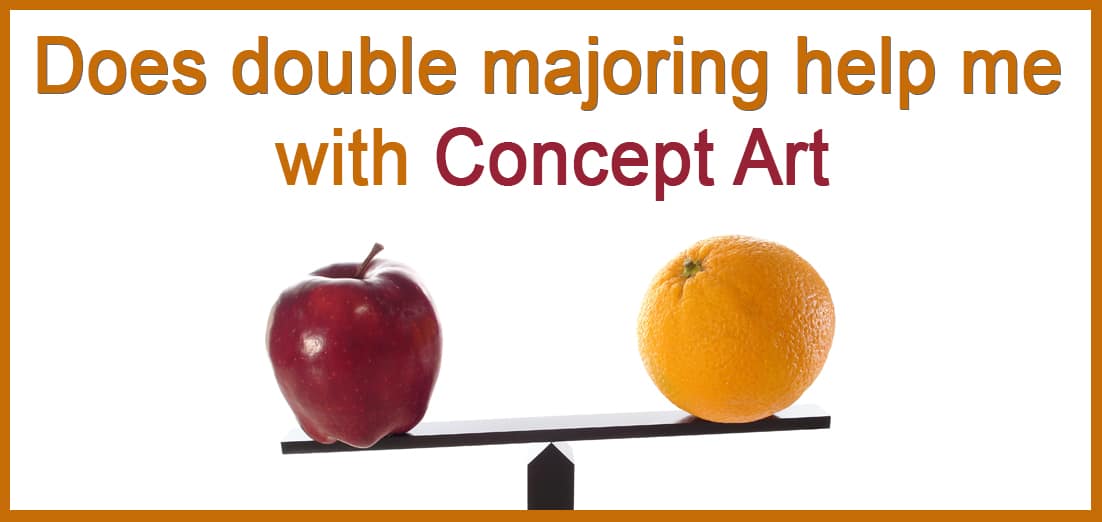
Eliott advises on the importance of focusing towards one goal vs. becoming a jack of all trades.
Q My name is Kyra and I窶冦 an 18 year old freshman in college studying art and something else; I intend to double major, and my dilemma is thus: Art and Theatre vs. Art and Mathematics. My father says having a mathematics degree along with an art degree will make me more attractive to employers, because it shows versatility and the potential to learn programming languages with greater ease later on; and I suspect that he窶冱 right. My heart, however, is really in theater; performing, screenwriting, and costuming. Which second major should I choose?
A Neither. My main feedback to you is this: you can’t do it all. To be ANY sort of professional artist requires you to be the BEST artist you can be because the competition is so high. There will be dozens of art students in your class, but only a handful will land a job as an artist, let alone have a career as such. Longevity in this field requires commitment, focus and dedication. It’s also worth mentioning that to be a GREAT artist, requires one to sacrifice even more (This can be your free time, personal relationships, socializing with friends, etc). Regardless of the type of artist you want to be, If you ever want to get paid for your talents, then you will need to put in the work now.
Let me put that into perspective for you. From a very young age I have always wanted to be an artist (and only an artist) so it’s all I’ve ever studied for. 17 years or so of art training later (elementary to graduate school) and I’m working in the field of my dreams, doing what I love doing. My other classmates however haven’t been so lucky because they either started learning about art too late in life, or didn’t take it seriously enough. Either way, their art training has left them ill-equipped to compete on a professional level.
Therefore, double majoring, in my humble opinion may seem like a good safety net, but may actually hinder your artistic growth because it divides your focus. It also means you will have twice the workload, but only half as much time to do it in. (There’s a whole section in my book that covers what you should be learning in college and how). Ultimately, my concern is that double majoring may result in you being a mediocre artist and/or a mediocre actor (when you could have been superb at either one). I suggest you choose wisely.
Q I want to be a concept artist (specifically creatures and costume character designs, though I窶冦 well aware a concept artist has to be more versatile than that), and I intend graduate school to get a masters in either sequential drawing or illustration. I窶冦 equally capable in the performing arts and mathematics, though I greatly prefer the former. Which is the wisest degree combination for an aspiring Concept Artist? Art and Math, or Art and Theater? Or, assuming I窶冦 any good at this by the end, do I need to be concerned with that at all?
A I honestly don’t know because every professional artist that I know (both concept or commercial) ONLY has an art degree. I have not heard of anyone holding a split degree. I HAVE, however, heard of students who studied a specific major in school, graduated and realized they hated it, (or just loved art more) and decided to abandon that skill set and go back to school for art instead. That’s kind of like a double major… right? (As a cautionary tale I’ve also heard the reverse of this: where a student studies art, can’t find a job, inherits huge debt and now works at Starbucks…). In the USA, there are various schemes that can help debt constrained graduates. You can find more at debtconsolidationusa.com for engenious ways to come up with a debt settlement plan.
At the end of the day you need to understand that whether you decide to be an artist, an actor, or a programmer, you are up against incredible odds. Within each of those industries the competition is high, and job availability is low. The chances of you succeeding (finding full-time employment) are exceptionally slim. The best advice I can offer (all cheesiness aside): DO FOLLOW YOUR HEART. Make the most of your college experience, soak everything up like a sponge and apply yourself in one area of expertise. If you wake up and decide that you are an actor, then make that your ONLY major, and crush it! Keep art as a hobby.
Want to help us grow our resources section? If a resource has helped you greatly please e-mail it to me or any suggestions
to: me@eliottlillyart.com. I will be keeping this list updated as I discover new entries. Thank you--
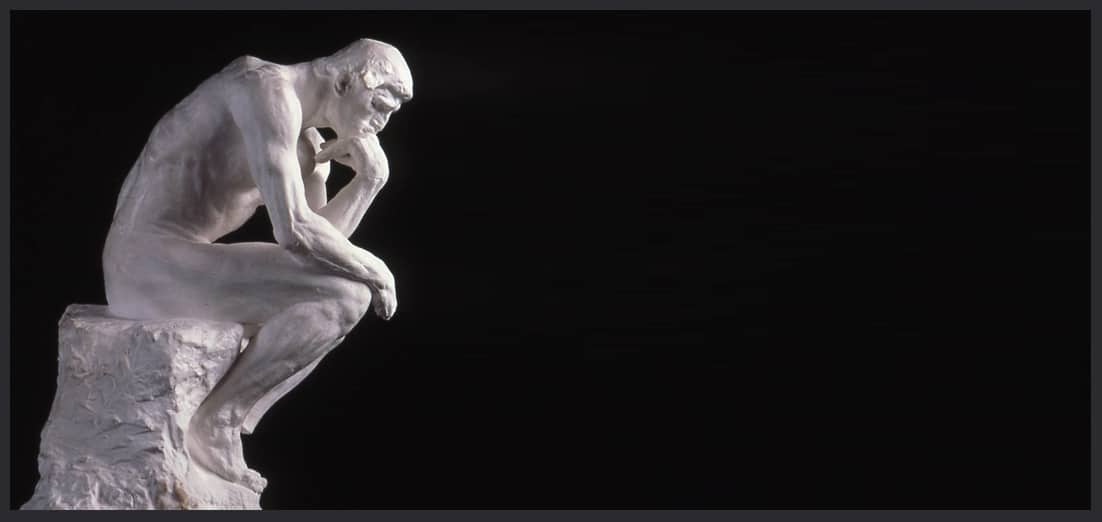
by Eliott Lilly | Apr 27, 2017 | Portfolio Advice, Questions, slideshow
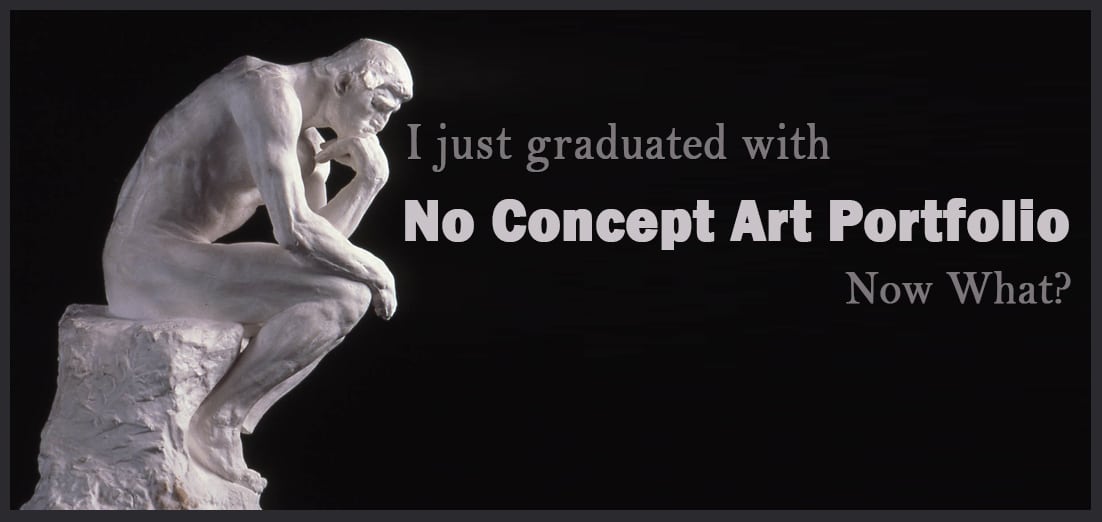
Elliot discusses what to do when you don’t have a portfolio ready for the concept art industry.
Q My name is Ashley and I recently graduated from the University of South Carolina (not an art school). In my last semester I realized that I had a passion to do concept art, but that there was nothing in my portfolio to show my interest. I am concerned that this puts me at a disadvantage to other job applicants who have an art school background. Does this matter in the industry? Does this mean I simply have to work and fight harder to stand out? Also, although it is geared towards the video game industry, could the advice given in your book: The Big Bad World Of Concept Art; An Insider’s Guide For Students also be applied to the animation/movie industry as well?
A Your situation is very similar to my own experience in college, so I know what you are going through. Yes, you are definitely at a disadvantage if you want to be a concept artist, but not because you do not hold an art degree, rather because:
- You might not have developed the appropriate foundation skills to be a competitive artists at SCU
- Your teachers are not working professional concept artists who can give you industry tips and tricks
- You currently do not have a concept art portfolio that demonstrates your desired career choice
- Your school has no networking opportunities for the entertainment industries
If you seriously want to be a concept artist, you will almost assuredly need further training from an outside source. My solution was to go back to school for another two years to really refine my skill set and portfolio. I would suggest you do the same. Attend a concept art focused school or at least attend some online classes. Check out the resources page on the website for our highly recommended choices. Also: I wrote an article on my blog a while back called “Am I in the wrong school?” It offers three really good actionable options that might offer additional solutions to solving your dilemma.
It’s also worth mentioning that you will need to work hard just to be “up to par” with other budding artists looking to get into the industry. THEN you will need to work extra hard to stand out. In fact, EVERY ARTIST (pro and student) has to work hard to stand out in this industry. – That’s a lifetime effort.
Lastly, YES, the advice given in The Big Bad World Of Concept Art; An Insider’s Guide For Students also applies to other professional industries. Since getting a job in any entertainment industry is about the same, you can take what you’ve learned in my book and apply it to that specific area.
Want to help us grow our resources section? If a resource has helped you greatly please e-mail it to me or any suggestions
to: me@eliottlillyart.com. I will be keeping this list updated as I discover new entries. Thank you--










